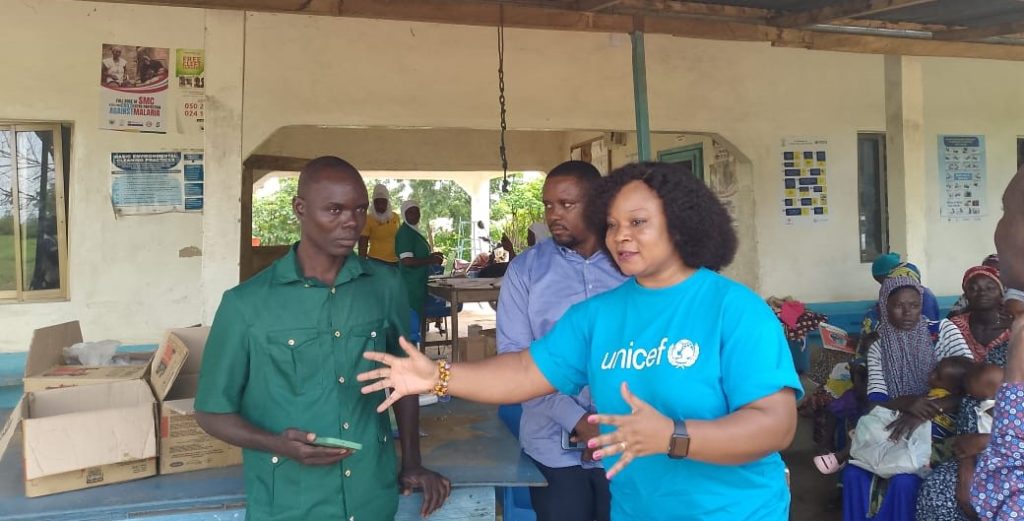By Solomon Gumah
Karaga (N/R), Oct 03, GNA – The Community-Based Management of Acute Malnutrition (CMAM) and the Community Infant and Young Child Feeding (C-IYCF) interventions have been lauded for helping to improve the nutritional status of children in the Northern Region.
The interventions are being implemented by UNICEF in partnership with the World Food Programme with funding support from the French Government.
The interventions facilitated the training of health staff and community health volunteers on screening and referral of children with severe acute malnutrition, community mobilisation with critical nutrition messages on anaemia prevention, proper infant feeding, use of micronutrient powders and skilled birth delivery.
Mr Joseph Nakoja Banyala, a Senior Public Health Officer at the Karaga Health Centre, speaking during the team’s visit to the facility, said 240 cases of child malnutrition were recorded, 141 were treated whilst 92 were still under treatment from March to September, this year, when the interventions were implemented in the district.
Mr Benedict Ofori Appiah, Northern Regional Coordinator of the Community-based Health Planning and Services, thanked UNICEF and partners for complementing efforts of the government in addressing malnutrition and improving maternal health care services in the region.
He said through the interventions in the Karaga District, series of community mobilisation events had reached over 9,073 members with critical nutrition messages on anaemia prevention, proper infant feeding, use of micronutrient powders and skilled birth delivery.
He said a total of 7,734 children under two years were introduced to the micronutrient powder supplementation, which also contributed to the reduction of under two malnutrition by about 15 per cent in the area.
Mr Appiah said in the first quarter of 2024, children above six months in the area were introduced to family foods, adding early initiation of breastfeeding also showed a strong improvement by 99% with some facilities achieving 100%.
He underscored need for regular supply of key nutrition commodities and medical equipment, improved integration of nutrition programmes with broader development initiatives, enhanced logistical support for outreach services and continued capacity building for health workers and community volunteers.
When the team visited the Nyanshegu Health Centre in the Sagnarigu Municipality of the region, Mr Shaban Iddrisu, Secretary of the Community Health Management Committee (CHMC) said the Committee, amongst others, collaborated with traditional leaders, local authorities and religious groups to advocate improved child nutrition and garnered community support for nutrition interventions.

Some members of the Committee called for support to enhance monitoring and evaluation, and the need to establish a system of tracking CHMC’s activities to help measure progress and improve efficiency.
Madam Porbilla Ofosu Apea, Health and Nutrition Officer, UNICEF, Tamale Field Office, said the interventions were being carried out as part of efforts to promote optimal growth and to ensure that children with severe acute malnutrition were identified early to pave way for the right and appropriate treatment.
She said about 4,000 health facilities across the country were now providing such services, adding the treatment of malnutrition had been brought to the doorsteps of the citizenry.
She touched on sustainability and said “RUTF has become part of the essential drugs’ list such that facilities can now confidently prescribe it for people with severe acute malnutrition to access without having to consistently rely on donors’ support.”
Madam Salmu Issahaku, a mother of four children, who lives at Yapalisifong in the Karaga District of the Northern Region, said the interventions, which provided ready-to-use therapeutic foods (RUTF), a food and medicine for malnourished children, had restored her two-month-old son, to total health after 10 weeks of treatment from malnutrition.
Madam Mary Adengiba, Technical Officer in charge of Nutrition at the Karaga Health Centre confirmed Madam Issahaku’s story and said Madam Issahaku’s son who was discovered during a community mobilisation and case search, at the time now weighed 5.0 kilogrammes (kg) and the mid-upper arm circumference stood at 10.5 centimetres.
Other mothers shared their stories while interacting with a team of journalists and officials from the United Nations Children’s Fund (UNICEF), who visited beneficiary communities in the region to assess their impact.
GNA